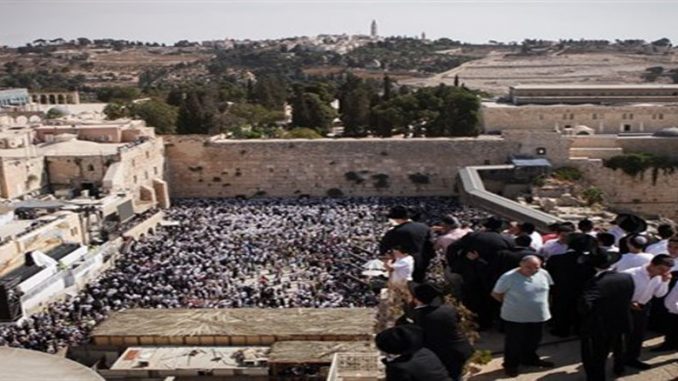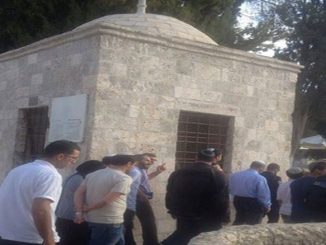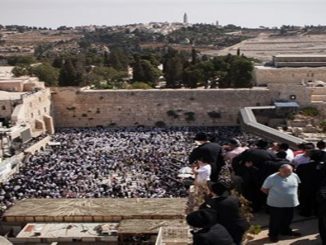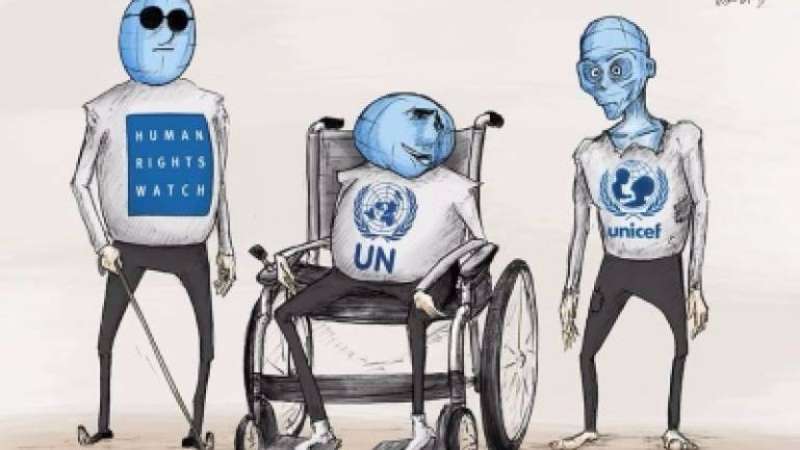
The Palestinian Ministry of Foreign Affairs called on the United Nation Security Council on Monday to uphold its responsibilities vis-a-vis international law and protect occupied East Jerusalem from the latest Israeli attempts to “Judaize” the city.
The statement came a day after the Israeli security cabinet held a controversial meeting in tunnels located underneath the Old City of East Jerusalem, which was annexed by Israel in 1967 in a move which was never recognized by the international community.
During the meeting, Israeli Prime Minister Benjamin Netanyahu notably unveiled a 200 million-shekel ($56 million) plan to build a 1,400-meter long cable car linking western Jerusalem to the Western Wall in the Old City by 2021, Israeli news outlet Ynet reported on Monday.
Such a project, which Netanyahu said would fall under the purview of the Israeli Tourism Ministry, would in effect limit tourists’ exposure to Palestinian-majority areas of East Jerusalem, and further use the industry as what critics have called a “tool” to enforce the perception of Jerusalem as a Jewish city.
Meanwhile, Israeli newspaper Haaretz reported that the cabinet had also approved a plan to financially incentivize Palestinian schools in East Jerusalem to switch to the Israeli school curriculum during the same meeting.
The Palestinian Ministry of Foreign Affairs condemned Israel’s “Judaization campaign” in East Jerusalem, including the cable car project; the planned construction of elevators and passages connecting the Western Wall, one of the holiest sites of Judaism, to Jewish-majority neighborhoods in Jerusalem; the expansion of a contested tunnel network in East Jerusalem which has threatened the structural integrity of Palestinian homes; and plans to expand illegal settlement construction in the city.
According to the ministry, such projects threaten the Arab and Islamic heritage of the city, while aiming to marginalize Palestinian Jerusalemites.
The ministry went on to condemn the school curriculum plan pushed forward by Israel’s far-right Minister of Education Naftali Bennett, saying that it aimed to impose the Israeli narrative on the younger Palestinian generation at the detriment of their Palestinian history and understanding of the decades-long Israeli-Palestinian conflict.
Such measures by Israeli authorities in Jerusalem, the Palestinian ministry said, undermine the chances of achieving a two-state solution along 1967 lines with East Jerusalem as the Palestinian capital.
Abbas spokesman Nabil Abu Rudeineh said on Monday that “such arbitrary measures would harm efforts to revive the peace process and would lead to further tensions,” official Palestinian news agency Wafa reported.
Abu Rudeineh went on to “demand that the US administration not allow Israel to proceed with these dangerous steps.”
A growing number of Palestinian activists have criticized the two-state solution as unsustainable and unlikely to bring durable peace, given the existing political context and expanding illegal Israeli settlements in the occupied territory, proposing instead a binational state with equal rights for Israelis and Palestinians. Others still have warned against focusing the debate on reaching a political solution to the Israeli-Palestinian conflict, and have instead demanded that Palestinians be immediately granted the full set of human rights, independent of arriving at a political settlement based on either a two- or one-state solution.
The Foreign Ministry meanwhile reiterated that the inaction of the international community over Israeli violations of international law encouraged Israel to continue in colonial policies unabated.
In addition to calling on the UN Security Council to intervene against Israeli procedures in Jerusalem, the ministry also demanded that the United Nations Educational, Scientific and Cultural Organization (UNESCO) uphold its resolution passed earlier this month criticizing Israeli policies in East Jerusalem.
The UNESCO resolution reflected a softer version of a draft resolution passed last year that sharply criticized Israeli policies in Jerusalem, and which caused Israel to suspend its cooperation with UNESCO. Netanyahu notably announced on May 3 that Israel would withhold $1 million in payments to the United Nations in retaliation for the resolution.
While the Security Council passed a resolution in December denouncing Israel’s illegal settlement expansion, the United States, one of five Security Council member states with veto power, has typically prevented the passage of resolutions deemed critical of Israel.
US President Donald Trump, who promised during his electoral campaign to move the American embassy to Israel from Tel Aviv to Jerusalem, has been an outspoken supporter of Israel, despite issuing some lukewarm criticisms of Israeli policies since his inauguration.
The fate of Jerusalem has been a focal point of the Israeli-Palestinian conflict for decades, with numerous tensions arising over Israeli threats regarding the status of non-Jewish religious sites in the city, and the “Judaization” of East Jerusalem through settlement construction and mass demolitions of Palestinian homes.



